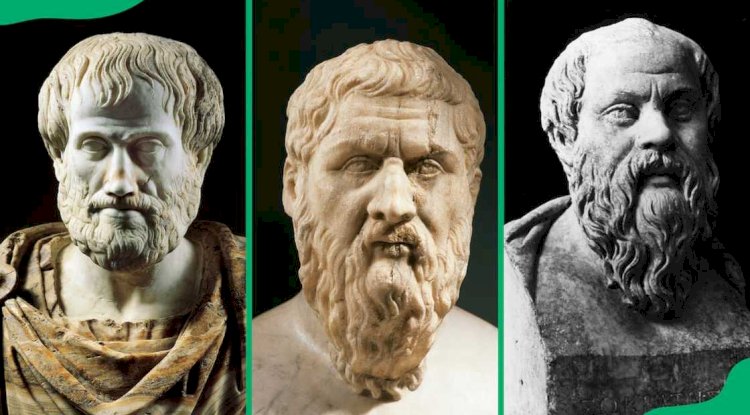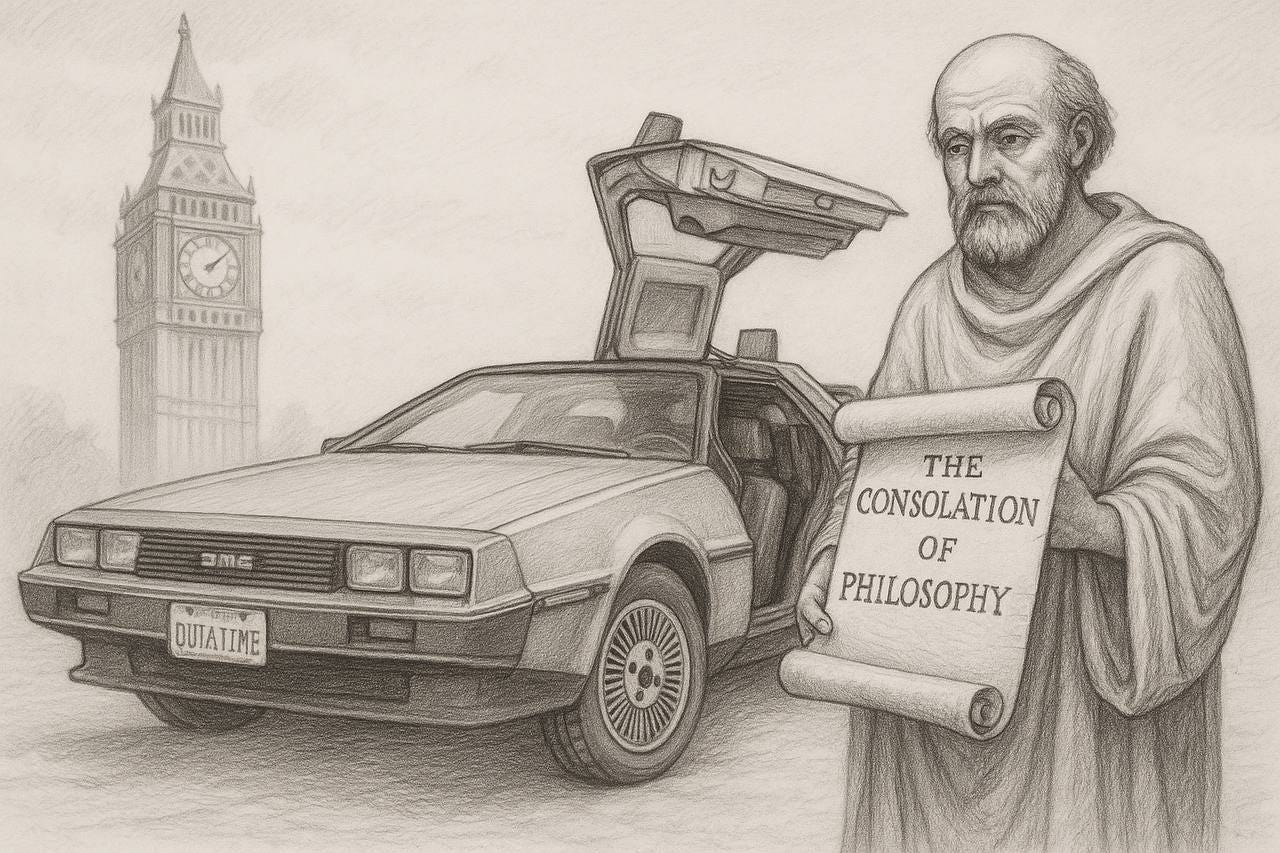God’s Foreknowledge Doesn’t Cage You

If God knows exactly what you’ll do tomorrow, do you still have a choice? Are you free, or just a passenger in a cosmic DeLorean, riding a timeline you can’t escape? This ancient paradox has left philosophers reeling for centuries—and Boethius, writing from a prison cell on the brink of execution, may have cracked the code.
Boethius was a Roman senator, scholar, and Christian who lived in the 6th century. Falsely accused of treason and sentenced to die, he didn’t spend his final days begging or raging. Instead, he wrote The Consolation of Philosophy, a dazzling dialogue between himself and a personified Lady Philosophy. It’s raw, brilliant, and so packed with truth bombs it still detonates minds 1,500 years later. Book V — the grand finale — dives headfirst into the problem of divine foreknowledge and human free will. And what he proposes is not just a philosophical Band-Aid. It’s a cosmic reframe.
Fatalism: The Soul-Killer
If God sees the future, isn’t it locked? Doesn’t that make prayer, repentance, and even love a theatrical performance in a script you didn’t write? This is the deadliest version of fatalism: the idea that freedom is an illusion and you’re just sliding helplessly down rails laid by the divine. Boethius sees the danger. He says, “if God foresees everything, and can in no wise be deceived, that which providence foresees… must necessarily come to pass.” (Book V, Section III). So what room is left for freedom? Good question. Philosophy’s answer doesn’t back down—it flips the table.
Evil Isn’t a Rival—It’s a Wreck
Before we get to the mechanics of freedom, Philosophy takes a crowbar to the notion of evil. Evil isn’t some dark force battling God for the soul of the cosmos. It’s a malfunction. A breakdown. “Evil is nothing,” she says flatly (Book III, Section XII). It’s not a substance; it’s an absence. A good thing gone twisted. That matters, because if evil isn’t a created force, God isn’t to blame—and the gears of divine governance can keep turning without implicating Him in the chaos.
God Lives Outside Time
This is the big one. Philosophy drops the bomb: God observes, not in time, but He “sees all things in His eternal present” (Book V, Section VI). Boom! This changes everything.
God isn’t peeking ahead at the script like a nervous playwright. He’s outside the theater entirely, seeing the whole play at once. Imagine Doc Brown floating above Hill Valley with an all-seeing drone, watching 1885, 1955, and 2015 unfold simultaneously. That’s how God sees history. He doesn’t guess or predict. He witnesses — timelessly.
Foreknowledge Isn’t Force
Just because God sees you eat the donut doesn’t mean He made you eat the donut. Boethius hammers this: “foreknowledge of future events does not in itself impose upon them the necessity of their occurrence.” (Book V, Section III). This is a hinge of the argument. Seeing doesn’t cause.
Imagine watching a replay of a football game you’ve already seen. You know the outcome. But your knowledge doesn’t change the players’ decisions. That’s how God’s vision works: not as a tyrant’s chain, but as a mirror reflecting what you freely do.
Lady Philosophy’s Killer Analogy

Here’s where things get sharp. Philosophy describes different levels of knowledge: sense, imagination, reason, and pure intelligence. Divine knowledge sits at the top, not just because it knows more, but because it sees differently. God doesn’t look at time like a traveler trudging from past to future. He sees it like a mountain-top observer sees the whole valley. All at once. Lady Philosophy says it like this:
“God abides forever in an eternal present… and embracing the whole infinite sweep of the past and of the future, contemplates all that falls within its simple cognition as if it were now taking place.” (Book V, Section VI)
So… Are We Free?
Absolutely. In fact, Boethius insists that freedom is what makes justice — and life — meaningful. Without free will, reward and punishment are a joke. Virtue is an accident. But Philosophy won’t allow that. She says, “the freedom of man's will stands unshaken, and laws are not unrighteous, since their rewards and punishments are held forth to wills unbound by any necessity” (Book V, Section VI). In other words, it is because you are free that you are capable of virtue.
And it’s not just moral encouragement. She’s backing this with metaphysics. God sees your freedom because He sees you truly. His eternal knowledge doesn’t erase your liberty. It testifies to it.
Don’t Blame God for Your Choices
Boethius would laugh bitterly at modern excuses like, “God made me this way.” No, He didn’t. He saw what you chose—without forcing your hand. His sight is perfect. But your will is still yours.
Philosophy is unflinching: That which is foreseen by God must indeed come to pass, but it does not follow that it happens by necessity. So yes, your story ends a certain way. But God didn’t script it against your will. He just already knows your path. And He invites you to walk it freely.
From a Prison Cell to a Timeless Mountain
Let’s not forget the setting here. Boethius is writing this while waiting to die. Betrayed, disgraced, forgotten. And yet, he writes of eternity like a man with one foot in it.
His solution to the paradox isn’t dry. It’s defiant. It says, “I am not crushed by fate. I am not a puppet. My choices matter — because God sees them, honors them, and elevates them to the eternal.”
Final Verdict: The Timeline Is Yours
So here it is: God’s foreknowledge doesn’t trap you. It testifies to your freedom. God is outside of time, watching your whole life with perfect clarity—but it’s still your life. Your virtue is still virtue. Your repentance is still real. Your prayers still matter. Because you’re not just drifting through a predestined reel. You’re driving.
What's Your Reaction?















